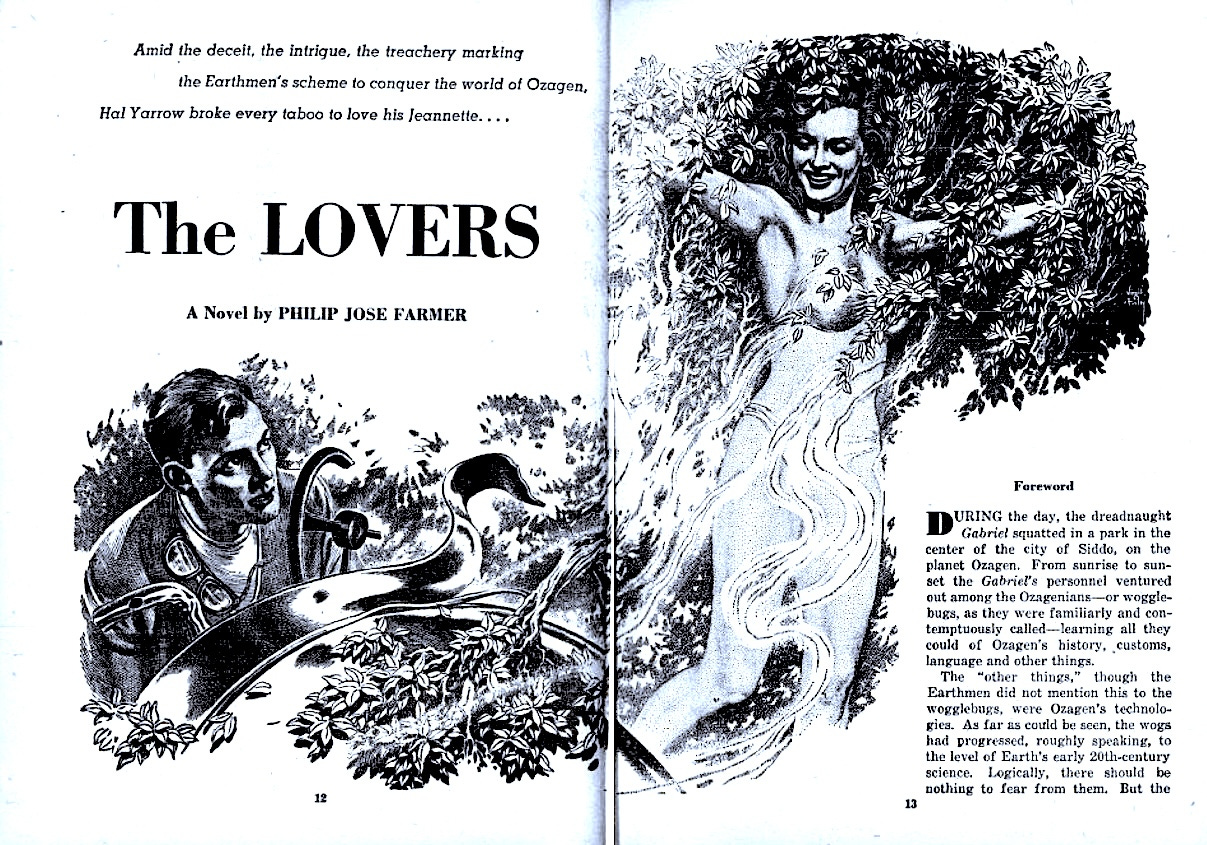Video and Podcast Resources On Philip Jose Farmer's "The Lovers"
six video and podcast lectures on this excellent speculative fiction novella
Philip Jose Farmer was a great science fiction and fantasy author who I first encountered back in middle school in the early 1980s, when I ran across and checked out some of his works at the Waukesha Public Library. He is perhaps best known for his highly imaginative and complex Riverworld, World of Tiers, and Dayworld series of novels. I’ve been enjoying rereading his works for decades, and highly recommend them to anyone interested in speculative fiction.
A few years ago, I produced a set of videos in my Speculative Fiction Studies series on his early novella, “The Lovers”. More recently, I discovered that I had never converted the sound files of those videos into Sadler’s Lectures podcast episodes, so I buckled down and did precisely that, releasing them all earlier this month. As I edit those podcast episodes, I get to hear what it was that particularly captivated me about the story, the worldbuilding, and the characters when I was producing the videos.
“The Lovers” would win the Hugo Award for Best New Science Fiction Author or Artist in 1953, and when you read it, even in the present day, more than 70 years later, it probably won’t be a surprise. It’s a genuinely excellent story for several reasons that I’ll mention shortly.
I should note, however, that the lectures I’m providing here are not focused on the story in its original state, published in Startling Stories in 1952, but rather on the expanded version of it, first published in 1961, and then republished in his anthology Strange Relations. The original story, interestingly, was rejected by some more traditional editors, namely John W. Campbell, editor of Astounding Science-Fiction and H.L. Gold, editor of Galaxy Science Fiction". And given some of its subject-matter, that’s quite understandable.
The Lovers has a reputation for having “broken the taboo on sex in science-fiction”, a claim that I think on its face is rather dubious, for reasons I talk about in the first lecture. If we reframe and qualify the claim in terms of depicting human beings having sex with other intelligent species, in the case of this story a parasitic pseudo-arthropod who is one of the titular “lovers”, well then Farmer was definitely breaking new ground.
What I particularly enjoy about the story, and perhaps you might as well if you read it, is not just the interplay between those two lovers, the human Hal Yarrow and the lalitha Jeanette Rastignac, as well as between Hal and some of the other characters, or the question about whether love felt between members of two species is as real and valuable as that between two humans. It is the extent of the worldbuilding that goes into the novel, both for the future Earth and for the planet Ozagen where most of the story takes place.
Earth has gone through an “apocalyptic war”, from which the human population is still recovering, centered around several surviving and thriving successor states. Hal happens to be unfortunate enough to be from the Haijac Union, dominated by the “sturch”, a combination of state and church, which is thoroughly imbued with a new religion founded by Isaac Sigman. Farmer provides enough narrative descriptions and interactions between characters to really flesh out these key aspects of the secondary world he constructs for the reader.
I could go on and on about this great story, but this is supposed to be a resource post, so I should get to providing you those links. Here they are, six lectures in both video and podcast form on Philip Jose Farmer’s novella, “The Lovers”.
Breaking The Taboo On Sex in SciFi? | watch video | listen to podcast
Earth After the Apocalyptic War | watch video | listen to podcast
Religion and Metaphysics of Isaac Sigmen | watch video | listen to podcast
The Planet of Ozagen | watch video | listen to podcast
The Lovers Hal and Jeanette | watch video | listen to podcast
The Lalitha, Parasitism, and Parallel Evolution | watch video | listen to podcast
I hope that you find these lectures interesting and that they spur you to reading this excellent early work by Farmer!


